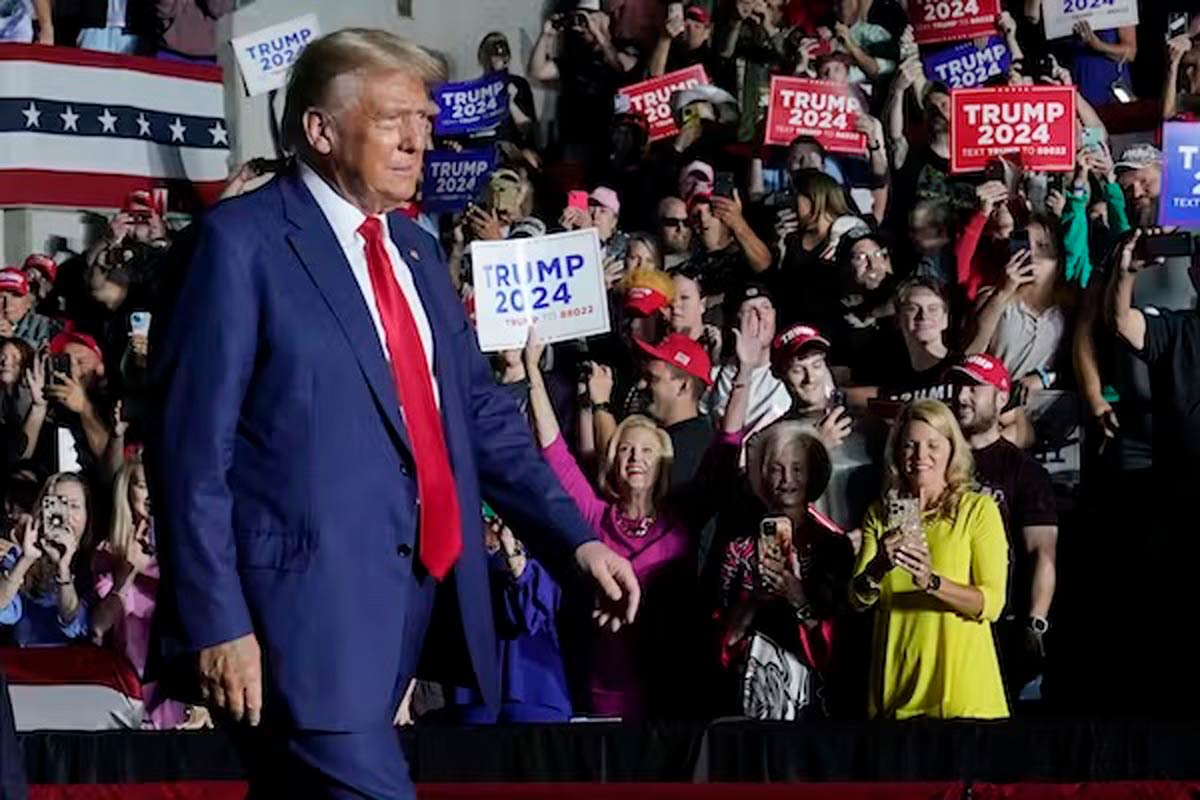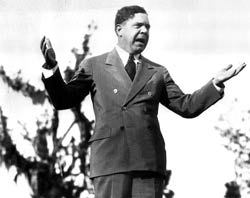Written by Ron Stagg, Toronto Metropolitan University. Photo credit: AP Photo/Seth Wenig. Originally published in The Conversation.
Those who support Donald Trump unconditionally have not wavered. Their support encompasses numerous groups and reasons, but first and foremost, they believe Trump gives them what they want.
People around the world — including many Americans — cannot understand why a sizeable portion of the United States population continues to support Donald Trump, despite an ever-increasing list of charges against him, including the latest indictments in Georgia.
Before the newest charges were announced, Trump was running neck and neck against President Joe Biden in a hypothetical rematch. It seems unlikely the Georgia indictments, pertaining to alleged attempts to interfere with the 2020 presidential election results, will erode the former president’s support.
This shocks people because strong backing of a man who lies, cheats and threatens the U.S. Constitution has no precedent in national politics. However, there is a precedent in state politics which almost reached the presidential level, and some comparable situations in other countries.
You can always get what you want?
Those who support Trump unconditionally have not varied much since the last election. This support encompasses numerous groups with numerous reasons, but, for most, there is one overriding concern. They believe that he will get them results on the issues that they feel are the most important in the country.
Evangelical Christians who support him do so because he appointed conservative justices, leading to — among other outcomes — the overturning of Roe v. Wade. His extra-marital affairs pale in comparison to this long-term goal of the Christian right.
Some disenchanted Democratic voters have joined the Trump bandwagon. They include blue-collar workers and small business people who see jobs being sent overseas, as well as some Latino voters who regard Trump as acting in concert with their Catholic morality by appointing justices who are more conservative. They also like his opposition to illegal immigration.
The tens of thousands of potential immigrants struggling to illegally cross the U.S.-Mexico border frighten those worried that they will lose the non-skilled jobs still remaining in the U.S., and those in rural areas who see the values of what they consider traditional white America under threat.
For all of these supporters, getting what they want is more important than worrying about Trump’s marital indiscretions, purloined government documents or whether he tried to overturn the results of the 2020 presidential election or encouraged the storming of the Capitol building on Jan. 6, 2021.

Lies become the truth
Of course, there is more to Trump’s appeal than simply promising to Make America Great Again. He is a true demagogue who repeats his simple message over and over again, often loudly and with great emphasis. He repeatedly and relentlessly demeans his detractors and lies about the 2020 election.

A quote attributed to Joseph Goebbels, the Nazi propaganda minister, translates roughly as: “Repeat a lie often enough and it becomes the truth.”
Trump uses this technique very effectively with his supporters, including those on the far-right fringe, who respond well to his implied message to “make America white again.” A substantial portion of the Republican Party reinforces Trump’s lies by either agreeing with his claims of election fraud, or being careful not to comment on them or to criticize Trump.
The effect of social media in Trump’s allure shouldn’t be dismissed. There you will find “proof” of Trump’s claims — plots by the “Deep State” and by Democratic justice officials to persecute the winner of the 2020 election. These allegations are highly effective with citizens who have turned away from mainstream media because of its criticism of the man who is working for them.

While there is no other presidential candidate who has used this demagoguery and appeal to prejudice so brazenly, there is a partial parallel in Huey Long, governor of Louisiana from 1928 to 1932 and a U.S. senator from 1932 to 1935.
A supporter of the poor, a harsh critic of banks and a believer in authoritarian government, he was famous for his rousing speeches. A controversial figure, he was dogged by accusations of political corruption but nonetheless loved by many. He was planning to run for president but was assassinated in 1935.
Trump’s Brazilian doppelganger
For a modern parallel, one must look outside the United States.
The most obvious parallel is in Brazil, where strongman Jair Bolsonaro ruled from 2018 to 2023. He is a man Trump admires, claiming that Bolsonaro “fights hard for, and loves, the people of Brazil — just like I do for the people of the United States.”

Bolsonaro believed in cutting taxes, defending “family values” and was opposed to gun control and immigration from places like Haiti and the Middle East. Considered racist, sexist and homophobic by some, his fiery speeches often incited violence, particularly against political opponents, criminals and “reds.”
He dismissed COVID-19 as a fantasy, resulting in Brazil having one of the highest rates of infection in the world. Defeated in 2022, he did not acknowledge the defeat, but said that he would abide by the country’s constitution.
He left the country rather than acknowledge his defeat, but his supporters stormed the Supreme Court, the congress building and the presidential palace to try to overturn the election. Unlike Trump, he’s been barred from running for office until 2030 because of his refusal to accept his defeat, and prosecuted for election fraud.
The coming months will reveal whether the charges against Trump will erode his support or instead encourage his supporters to continue donating millions of dollars to support his election bid and his legal fees. So far, those supporters are showing no signs of turning against him.

